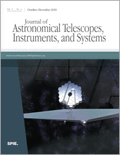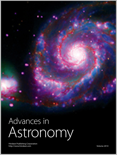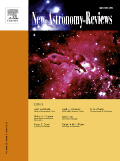
EXPERIMENTAL ASTRONOMY
metrics 2024
Illuminating the Cosmos with Rigorous Research
Introduction
EXPERIMENTAL ASTRONOMY, published by Springer, stands as a pivotal journal in the fields of Astronomy and Astrophysics as well as Space and Planetary Science. With an impressive Scopus ranking and a Q2 category as of 2023, the journal is recognized for its impactful contributions to experimental techniques and observations in astronomy. Covering a broad spectrum of topics from cosmic phenomena to planetary exploration, it serves as a vital platform for researchers, professionals, and students to disseminate and discuss innovative ideas and findings. The journal has evolved through various convergence years since its inception in 1989 and continues to thrive, fostering an environment for academic pursuit and collaboration. Though not an open-access journal, its rigorous peer-review process ensures high-quality publications that are essential for advancing the scientific community's understanding of the universe.
Metrics 2024
 0.89
0.89 2.70
2.70 2.60
2.60 51
51Metrics History
Rank 2024
Scopus
IF (Web Of Science)
JCI (Web Of Science)
Quartile History
Similar Journals

Kinematics and Physics of Celestial Bodies
Exploring the Dynamics of the CosmosKinematics and Physics of Celestial Bodies is a prominent journal published by PLEIADES PUBLISHING INC, dedicated to the exploration and understanding of celestial mechanics and the physical properties of astronomical bodies. With an ISSN of 0884-5913 and an E-ISSN of 1934-8401, this journal has established itself as a resource for researchers in the fields of astronomy, astrophysics, and space science since its inception in 2009. The journal is indexed in Scopus, where it currently ranks in the fourth quartile for both Astronomy and Astrophysics and Space and Planetary Science, making it a valuable platform for scholarly discourse despite its ranking. Its scope encompasses a range of topics related to the kinematics and physical characteristics of celestial objects, aiming to facilitate a better understanding of their dynamics and interactions within the universe. Although it does not operate under an open access model, the journal provides essential insights and findings, catering to the academic needs of researchers, professionals, and students engaged in the study of the cosmos. The journal's commitment to advancing knowledge in the various aspects of celestial physics ultimately contributes to the broader scientific community's endeavors.

Journal of Astronomical Telescopes Instruments and Systems
Pioneering Discoveries in Astronomy and Optical SciencesJournal of Astronomical Telescopes Instruments and Systems is a prestigious academic journal published by SPIE-SOC PHOTO-OPTICAL INSTRUMENTATION ENGINEERS, focusing on groundbreaking research in the fields of astronomy and astrophysics, instrumentation, and optical sciences. With an ISSN of 2329-4124 and an E-ISSN of 2329-4221, this journal has steadily established its relevance in the scientific community, achieving a respectable Q2 ranking across various important categories, including Astronomy and Astrophysics and Control and Systems Engineering in the year 2023. Spanning research from its inception in 2015 to projections through 2024, the journal continues to serve as a critical platform for disseminating innovative findings that advance our understanding of astronomical instruments and systems. As researchers, professionals, and students seek to stay at the forefront of technological advancements and scientific inquiries, the Journal of Astronomical Telescopes Instruments and Systems is an invaluable resource. The journal provides a valuable venue for peer-reviewed articles that stimulate discussion and drive forward the exploration of astronomical phenomena and instrumentation techniques, making it essential reading for those invested in the future of space sciences.

SPACE SCIENCE REVIEWS
Unraveling the Mysteries of Space ScienceSPACE SCIENCE REVIEWS, published by Springer, is a premier interdisciplinary journal that has been at the forefront of space science research since its inception in 1962. With an impressive impact factor and a distinguished Q1 ranking in both Astronomy and Astrophysics, as well as Space and Planetary Science, it stands as a leading platform for the dissemination of cutting-edge research. The journal encompasses comprehensive reviews covering a diverse array of topics, from cosmic phenomena to planetary exploration, serving as a critical resource for researchers, professionals, and students alike. Although it operates primarily under a subscription model, its commitment to excellence and rigorous peer-review process ensures that each article meets the highest standards of scientific integrity. With its headquarters in the Netherlands, SPACE SCIENCE REVIEWS is positioned strategically to foster global collaboration in the field, making it an invaluable asset for anyone interested in the ever-evolving landscape of space science.

Advances in Astronomy
Exploring the Cosmos, One Discovery at a Time.Advances in Astronomy is a prestigious open-access journal published by HINDAWI LTD, dedicated to the field of astronomy and astrophysics. Established in 2008, the journal aims to disseminate significant research findings and advancements in the understanding of celestial phenomena, planetary sciences, and the intricate workings of the universe. With an impact factor that reflects its relevance in the scholarly community, Advances in Astronomy holds a commendable rank of Q3 in both Astronomy and Astrophysics as well as Space and Planetary Science categories, indicating its importance within these fields. The journal also showcases a commitment to open-access publishing, ensuring that research is readily available to both the scientific community and the public. Researchers, professionals, and students alike are encouraged to contribute to this dynamic forum to share knowledge and foster collaboration in exploring the wonders of the cosmos.

Journal of High Energy Astrophysics
Advancing Knowledge: The Frontier of High Energy AstrophysicsThe Journal of High Energy Astrophysics, published by Elsevier, is a premier platform for groundbreaking research in the fields of astrophysics and high-energy phenomena. With an ISSN of 2214-4048 and an E-ISSN of 2214-4056, this journal has quickly established itself as a leader since its inception in 2014. Operating out of the Netherlands, it is recognized for its rigorous peer-review process and high-quality publications, earning an impressive Q1 ranking across multiple domains, including Astronomy and Astrophysics, Nuclear and High Energy Physics, and Space and Planetary Science in 2023. With a Scopus rank of 12 out of 90 in the Astronomy and Astrophysics category, and being positioned in the 87th percentile, the journal plays a pivotal role in disseminating advancements and fostering collaboration among researchers, professionals, and students. Though the journal is not open access, it offers robust subscription options for institutions and individuals seeking to dive into the latest discoveries and theories in high-energy astrophysics.

JOURNAL OF ASTROPHYSICS AND ASTRONOMY
Exploring the Cosmos, One Discovery at a Time.JOURNAL OF ASTROPHYSICS AND ASTRONOMY, published by the Indian Academy of Sciences, stands as a pivotal resource for researchers and professionals in the fields of astrophysics and astronomy, with a rich history of publication dating back to 1980. This esteemed journal aims to disseminate high-quality research, fostering advancements in how we understand celestial phenomena, space environments, and planetary sciences. With a current Impact Factor that places it in the Q3 category for both Astronomy and Astrophysics and Space and Planetary Science, it maintains a crucial role in the global academic community, particularly within India. Although not an open access journal, its scholarly contributions are vital for both emerging and established researchers striving to push the boundaries of our knowledge in the cosmos. The journal is indexed in Scopus, ranking 56th in Astronomy and Astrophysics and 72nd in Space and Planetary Science, reflecting its ongoing significance and reach in the scientific dialogue.

SOLAR SYSTEM RESEARCH
Connecting Researchers to the Wonders of the UniverseSOLAR SYSTEM RESEARCH, published by Pleides Publishing Inc, offers a comprehensive platform for the exploration and dissemination of scientific knowledge in the fields of Astronomy, Astrophysics, and Space and Planetary Science. With its origins tracing back to 1969, this journal provides a vital resource for researchers and professionals seeking to deepen their understanding of the solar system's complexities, including planetary formation, extraterrestrial geology, and the dynamics of celestial bodies. Although categorized in the Q4 quartile for both relevant disciplines, SOLAR SYSTEM RESEARCH remains committed to publishing high-quality research that contributes to advancing contemporary scientific discourse. Dedicated to fostering collaboration and innovation, the journal is indexed in Scopus and adheres to rigorous academic standards, making it an essential resource for students and professionals alike pursuing the latest developments in solar system studies.

Universe
Fostering Collaboration in the Realm of Astrophysics.Universe is a distinguished peer-reviewed journal published by MDPI, specializing in the dynamic fields of Physics and Astronomy. Established in 2015, this Open Access journal has rapidly gained recognition, achieving a prestigious Q1 quartile ranking in its category as of 2023. With its E-ISSN 2218-1997, the journal primarily serves the international scientific community, offering a platform for researchers to disseminate innovative ideas and findings. Based in Switzerland, Universe covers a wide range of topics within astronomy and astrophysics, ensuring that cutting-edge research is accessible to an ever-growing audience. Its commitment to open access principles since its inception allows for unrestricted dissemination of knowledge, fostering a collaborative environment essential for scientific advancement. By aligning its objectives with the promotion of high-quality research and interdisciplinary discourse, Universe stands as a vital resource for academics, professionals, and students aiming to contribute to and engage with the ever-evolving landscape of astronomical research.

NEW ASTRONOMY REVIEWS
Decoding the Universe: High-Impact Reviews for the Scientific CommunityNEW ASTRONOMY REVIEWS, published by Elsevier Science Ltd, stands as a premier journal in the field of Astronomy and Astrophysics as well as Space and Planetary Science. Established in 1998 and operating until 2024, this journal has consistently maintained a distinguished reputation, reflected in its Q1 categorization in both subject areas for 2023. It holds an impressive Scopus ranking, placed #6 out of 104 in Earth and Planetary Sciences and #7 out of 90 in Physics and Astronomy, showcasing its critical impact with a percentile rank of 94th and 92nd, respectively. Although not an open access journal, it provides vital insights and comprehensive reviews that are essential for researchers, professionals, and students eager to advance their knowledge in contemporary astronomical research and theories. With rigorous peer review and a commitment to high-quality publications, NEW ASTRONOMY REVIEWS is an indispensable resource for the scientific community striving to uncover the mysteries of the universe.

Journal of the Korean Astronomical Society
Fostering Collaboration: Insights from the Heart of Korean AstronomyWelcome to the Journal of the Korean Astronomical Society, an esteemed publication dedicated to advancing the fields of Astronomy and Astrophysics as well as Space and Planetary Science. Established in 1993 and under the reputable auspices of the Korean Astronomical Society, this journal serves as a vital platform for researchers and scholars from South Korea and around the globe to disseminate innovative findings and critical insights. With a commendable Q2 ranking in Astronomy and Astrophysics and a Q3 ranking in Space and Planetary Science, this journal is positioned among the influential voices in its fields, fostering collaboration and knowledge exchange. The journal's rigorous peer-review process ensures that published works contribute significantly to ongoing discussions and developments in astronomical research. While currently not an open-access journal, it remains accessible to the academic community, encouraging readers to stay abreast of the latest advancements in the sciences that elucidate the universe's complexities. Join us in exploring the cosmos through cutting-edge research and scholarly discussion that propels the field forward.